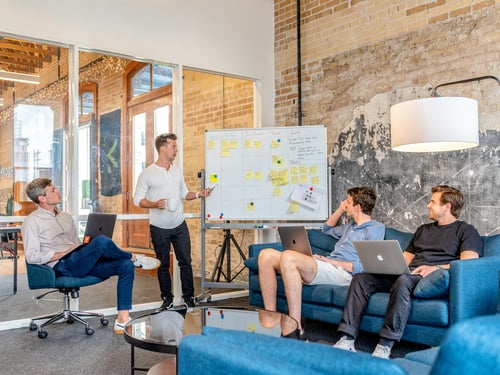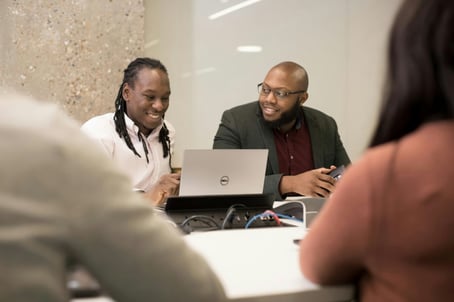How Boosting Self-Esteem in the Workplace Can Help Productivity
Many businesses are trying to improve the mental health of their teams. It has many benefits, from lowering turnover to ...
Read full blogCovid-19 saw millions placed on furlough at lower salaries and rates, lose work contracts or be made redundant.
With so much more competition, candidates must be ever more innovative and expend more efforts in the job-hunting process. After landing an interview for a potential role, applicants will be expected to prove their skills and knowledge, and differentiate themselves from perhaps dozens of other candidates, during a second interview.
Here are six ways to prepare for successful second interviews.
Now that your interviewer has sifted through applications and added you to their shortlist, they’ll need to ask increasingly probing questions to differentiate you from other applicants and ascertain exactly why you are the best candidate for the job. Whilst your first job interview will have included a brief discussion around your CV and checking off your skill and experience, a second meeting will aim to dig deeper into your skillset and knowledge.
Expect competency-based interviews where your hiring manager will be wanting to find out specific examples of your abilities. Use your previous experience to support your CV: discuss achievements of yours that match those required by the job application, and talk about challenges that you have overcome by using and building on your skills. Prepare answers to questions such as:

Whilst first meetings will normally be a one-to-one discussion (or in some cases, a group interview amongst several other applicants), many employers will involve their other colleagues a second get-together. Meeting more employees enables applicants to ask questions about culture and working style and receive more diverse and honest opinions, and enables hiring managers to both ascertain cultural fit and get second and third opinions on the quality of each candidate.
Be prepared to meet a range of new people at your second interview, from business Directors and potential managers, to new colleagues or direct reports. Depending on the organisation and the role you are applying for, this meeting could take place at the office or worksite, or at a more informal place like a pub or bar for team drinks.

Whilst interviews are used by companies and HR departments to ascertain the right person for the job, they also present the opportunity for you to ascertain whether this employer is the right one for you. Imagine you were starting the job in the next few weeks – what would you want, and need, to know? This could be your last chance to ask questions before a potential job offer: is there anything that you didn’t cover in your first meeting or in the job description?
Use your first meeting to inform the questions you ask in the second. Was something mentioned that you weren’t expecting, and you need to know how much of it will be involved in the role? Was there anything that wasn’t fully covered that you would like clarification on? Crucially, what did your hiring manager discuss in the first interview that they seemed particularly interested in or impressed by, that you can use to probe further questions to demonstrate your interest and enthusiasm for the company and build rapport with your interviewer.
If you have been called back a second time, your potential employers will have been impressed with your first meeting. Continue to build on your own personal candidate brand by standing out from the crowd and personalising the interview to your own capabilities to ensure you are the best and most remembered applicant. Reinforce your positive attributes, particularly those that were well received in your first meeting – even if your first meeting demonstrated how your skills match the job description, utilise all second interview questions as a chance to re-emphasise your competence and fit for the role.
Cement your positive second impression by learning about your interviewers and personalising your meeting towards them and their roles. Ask your contact who you will be meeting – get their names so that you can look them up on LinkedIn and read more about them on the company website. Researching and knowing your interviewers will enable you to predict the types of questions they may ask you and what they would prefer your answers to be, enabling you to prepare in advance.
This knowledge will also enable you to target your own questions according to each interview, for example:

Day rates and salaries are often not discussed until the latter stages of the recruitment process, meaning the end of a second interview may present this opportunity. As your potential employer will already have established their expectations regarding, you will also need to come prepared with your own expectations – and prepare to negotiate. Do plenty of research beforehand to ensure you are in the know about your market worth, by benchmarking current salaries at similar job roles in similar companies, including benefits and bonus packages.
Recruiters and hiring managers will also want to know your availability and any notice period or mitigating circumstances before they formalise a job offer, which you may also be able to leverage in negotiations regarding salaries and benefits. Also ensure you discuss any additional requirements for the position, such as travel or shift patterns, to align your own expectations with those of your potential employer and get everyone on the same page, ready for a positive job offer.
Your recruiter will have spent time previously exploring your skills, knowledge and experience, and will have at the end of the second meeting ascertained whether you are a professional fit for the role. However, your potential employers will want to know you as a person: what you value, how you think and what it would be like to manage, work with and be managed by you, and how your personality will impact on the business and its teams.
Expect questions such as:

Looking for your next career move? Read our Complete Guide to Video Interviews.
View and apply for our latest technical and Engineering roles.
Many businesses are trying to improve the mental health of their teams. It has many benefits, from lowering turnover to ...
Read full blogFor years young people in the UK have been told they must get a degree to have a successful career. But there are severa...
Read full blogAs more people than ever before are graduating from University, taking internships, completing further education through...
Read full blog
Nicosia, Cyprus
© VHR 2020 | All Rights Reserved